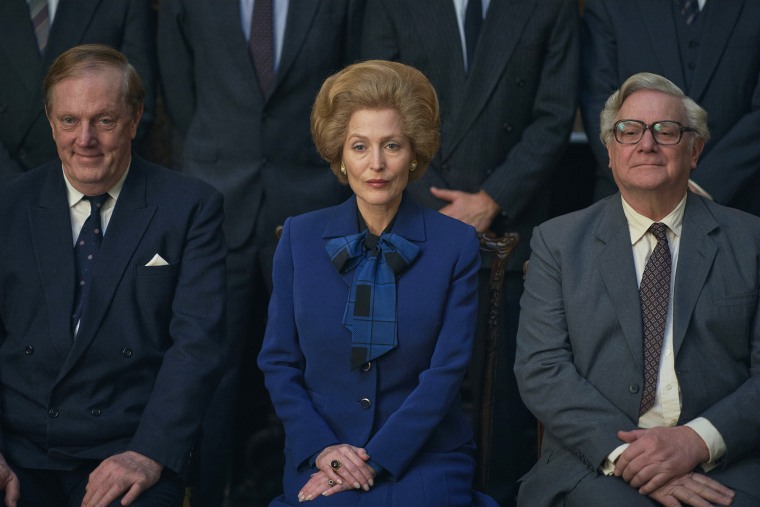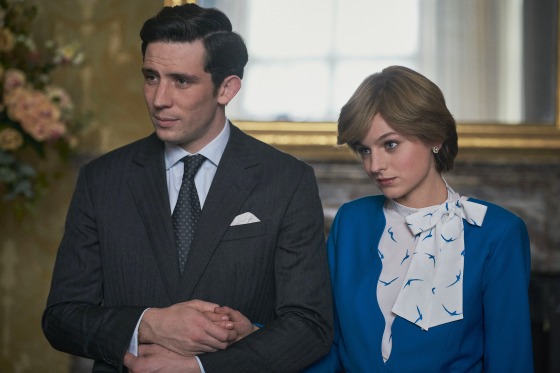In many ways, “The Crown” is a holdover from another, more aspirational era of Netflix history. The ambitious series was greenlit for six seasons, sight unseen. And with digital aging not yet a possibility at the time, the decision was made to totally recast the show — twice! — to portray four generations of the Windsor family and its monarch Queen Elizabeth II. Now in its fourth season and two-thirds through the project, “The Crown” is a critically successful, idealized vision of what prestige TV should be. Moreover, this season has finally added the last, previously missing piece: a universally gripping narrative.
Now in its fourth season and two-thirds through the project, “The Crown” is a critically successful, idealized vision of what prestige TV should be.
Netflix felt comfortable greenlighting “The Crown” due to series creator Peter Morgan’s experience dramatizing Elizabeth II. His first major hit, “The Queen,” was a historical drama covering Elizabeth’s response to Princess Diana’s death in 1997. The knowledge that “The Crown” would eventually cover the same period (but far more in depth) was a major selling point.
But Diana’s long shadow has also been a distraction at times. The last five episodes of Season 3, for instance, were undermined by endless throat clearing ahead of the imminent arrival of Diana (Emma Corrin), and a seemingly desperate attempt to make Charles (Josh O’Connor) appear as sympathetic as possible. The Diana fixation only paused occasionally to set up the arrival of the other major female British figure of the 1980s: Margaret Thatcher (Gillian Anderson).

Both women finally make their entrance in Season 4’s premiere, and their presence gives the series a double dose of electricity, made all the more fascinating because they are never onscreen at the same time. In effect, the fourth season of “The Crown” has turned Diana, Margaret and Elizabeth (Olivia Colman) into a Shakespearean play: A woman born to greatness, a woman who achieved greatness and a woman who had greatness thrust upon her.
Anderson’s transformation into Margaret Thatcher is a wonder to behold. Her "Iron Lady" is damn near uncanny, capturing the mannerisms and voice of the woman who’s 11-year tenure changed the course of British history. It helps that creator Morgan (who is dating Anderson in real life) has written her a full course meal of a role. This Thatcher is ferocious, insecure and layered, with an internalized misogyny that runs so deep, she even dislikes her own daughter. All this while priding herself on “doing it all” — from running the country to making her all-male cabinet dinner. She is the ultimate opportunist, who at times drifts dangerously close to grifter territory, all while insisting that for the country’s sake she must pull the opportunity ladder up behind her. Her meetings with Colman’s queen are riveting, as the two women swing from mutual respect to icy hatred and back again, sometimes within the same scene.
Anderson and Colman’s scenes together are the stuff awards shows were made for, and their performances are what makes “The Crown” one of the most sought-after productions to work on. But they are really only two members of an incredibly talented ensemble cast that this season also includes Helena Bonham-Carter as a rapidly aging Princess Margaret, Marion Bailey as the old school Queen Mother, Erin Doherty as the icy Princess Anne and Emerald Fennell as Charles’ long-suffering mistress Camilla Parker-Bowles.
But it’s Emma Corrin’s Diana who will achieve something the series has thus far been unable to do: bring in the viewership to match the star power.
Emma Corrin’s Diana who will achieve something the series has thus far been unable to do: bring in the viewership to match the starpower.
Most attempts to portray Diana have failed because they fall into the hagiography trap, forgetting she was not the martyr many fans try to make her out to be. Charles is sometimes regarded as a fool for selecting her, but he was smart enough to recognize her superstar potential. He just never realized she’d eclipse him. And as “The Crown” sees it, her greatest failing was that she didn’t understand she was never supposed to.
Corrin plays Diana as an innocent, who only began to love the public when she found her personal life empty of similar adoration. The series also explores her mental health issues, diving into how little the royal family was prepared to understand the complexity of the situation. (Every episode that prominently features her comes with an eating disorder warning, and they aren’t playing around.)
But the show’s writing is far from simplistic. Her innocence is born of self-absorption, her failure to understand her role seems to stem from a lack of imagination, her marriage’s collapse is as much a function of her inability to understand Charles as it is a failure by him to understand her. Like Philip in Seasons 1 and 2, this is a wonderfully well-rounded character, neither saint nor sinner. Even as Diana keeps trying to do what she thinks it the right thing, one can understand why Charles, and the rest of the royal family, are frustrated and irritated by her behavior.
Perhaps that’s why Tobias Menzies, who has felt somewhat underused as Philip in Season 3 and 4, gets the final word this season when it comes to Diana. She may feel like an outsider, but so do they all, looking in at and revolving around the only person in the family who really matters: Elizabeth.
Diana may say she wants to be part of a team, but she’s mostly incapable of centering anyone other than herself. It feels like a condemnation, and yet, considering how this institutionalized focus on Elizabeth has broken the lives of so many people around her, Diana’s self-centeredness feels logical — almost necessary.
Season 5 begins filming next year with a whole new cast, this one featuring Imelda Staunton, Jonathan Pryce, and Lesley Manville. And after Season 4’s tour de force, the final cast has big shoes to fill heading into the 1990s and the show’s final two seasons. But like the series itself, the cast and the story of “The Crown” keeps getting better with age.


